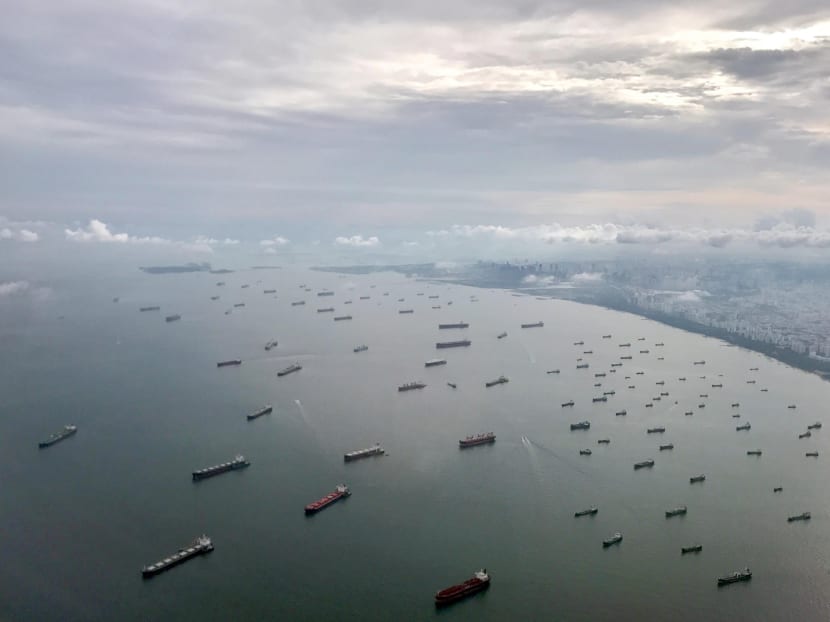Let’s get digital in the maritime industry: Advisory committee
SINGAPORE – Fully autonomous vessels, electronic professional certificates, and ships with minimal carbon footprints: This is the future direction of the maritime industry, experts say.

A bird's-eye view of ships along the coast in Singapore. Reuters file photo
SINGAPORE – Fully autonomous vessels, electronic professional certificates, and ships with minimal carbon footprints: This is the future direction of the maritime industry, experts say.
The need to develop a vibrant maritime innovation ecosystem and promote digitalization in the industry has been proposed as a key strategy by a committee set up to chart the development of Singapore’s port and maritime sector.
In its International Maritime Centre (IMC) 2030 Strategic Review released on Friday (Sept 22), the committee said the adoption of technology is expected to magnify disruptive forces and rapidly shift competitive dynamics in the maritime industry.
To enable Singapore’s maritime industry to ride the next wave of innovation-driven growth and move up the value chain, a “concerted effort” is needed. This can be done using business models that employ advanced technologies such as autonomous systems, robotics, data analytics and artificial intelligence, the report said.
It called for the building of a strong maritime cluster centred on the alignment of innovation and research and development efforts between the public and private sectors. It also highlighted the need to leverage on technology such as Big Data, Internet-of-Things and intelligent systems.
Mr Steen Brodsgaard Lund, a Singapore Shipping Association council member and chairman of its technical committee, said: “There is no doubt that technology has been and continues to be important for shipping lines and the infrastructure for the maritime industry. It is also an enabler to set free the manual processes.”
Fully autonomous or “self-sailing” ships would make the industry safer for humans, said Mr Lund, who is also the Executive Vice-President and regional manager (South East Asia & Pacific) at DNV GL, a global quality assurance and risk management company.
Technology will also allow old-school processes to be digitalized and made more efficient, he said. For example, seafarers’ crew competence certifications are currently carried around in paper form. “It is easy to digitalise that. Many of the ways are archaic,” he said.
Adopting technology can also help ships reduce emissions and help cut their carbon footprints, said Mr Teo Siong Seng, the managing director of homegrown Pacific International Lines and chairman of the Singapore Business Federation.
Meanwhile, Mr Glenndle Sim, executive chairman and chief executive of Mencast, said embracing technology has helped the company reduce manpower costs and maintain its competitive edge. Mencast, which does maintenance and repair works for ships, has adopted robotic cleaning devices, reducing the need for manpower while increasing productivity.
The IMC2030 review committee also recommended promoting physical clusters of maritime-related activities within Singapore, between its adjacent industries of logistics and commodity trading, and with other international maritime clusters.
There is currently a maritime belt along Shenton Way bustling with ship owners, banks and finance companies, insurance and law firms, as well as brokers and maritime research companies. The recommendation also included exploring the formation of such clusters away from the central business district.
The experts were neutral with this recommendation. “Singapore is a small place, and commuting is easy,” Mr Lund said. However, he noted plans for integration at the new Tuas port, which will be opened progressively in a couple of years and be fully completed by 2040.
“It very much depends on the business. If it is really just coordinating sales, it can be done anywhere. But I guess, every little thing helps. With the supporting industries around, there is an ecosystem in place,” said CIMB economist Song Seng Wun.





